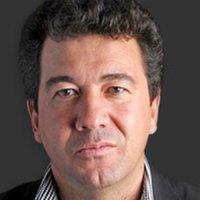Donald Trump and the end of American exceptionalism?
- Published
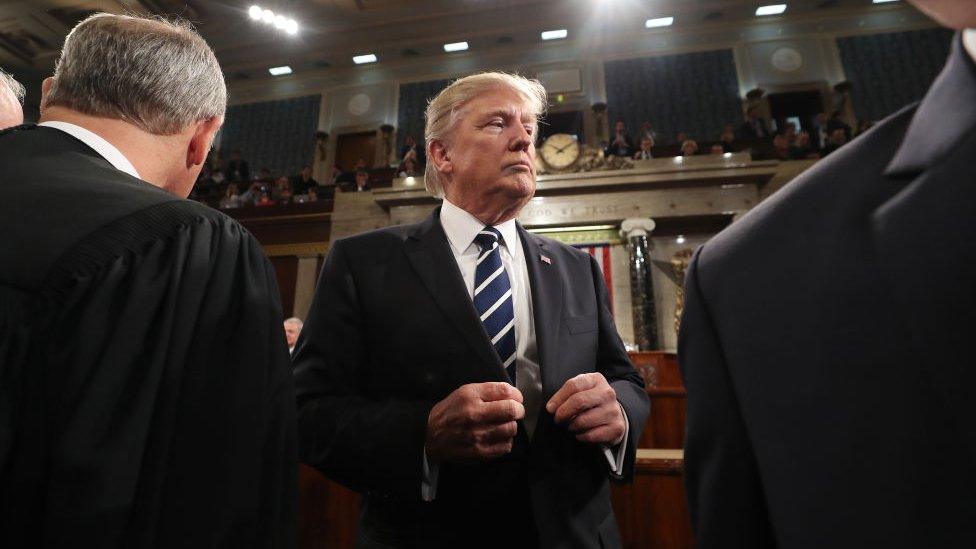
When a German Chancellor feels the need to explain the refugee convention to an American president, the speaker of British House of Commons says the leader of its closest ally is not welcome to address parliament, China positions itself as the grown-up in the room by chiding him for his blunt Twitter diplomacy and the botched travel ban is denounced not just by US adversaries, such as Iran, but allies, such as France and Canada, is it not time to sound the death-knell of American exceptionalism?
That is, the credo pushed by successive presidents that the United States is a beacon of democracy, an exemplar of human rights, an indispensable country imbued with special values and beliefs that grants it the moral authority and national self-belief to influence and admonish other countries, friend and foe alike.
Donald Trump, rather than being heralded as the leader of free world, has been pilloried. By protesters who took to the streets - and snow - from Australia to Antarctica as part of more than 600 protests worldwide on the first weekend of his presidency.
By satirists who came up with the "Netherlands Second" viral video - and all its other cheeky iterations - in response to Trump's "America First" doctrine.
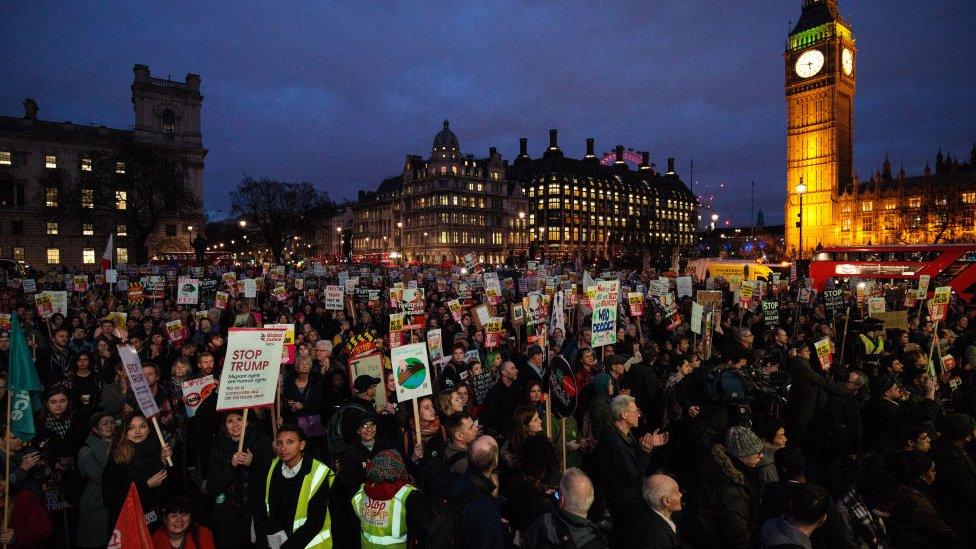
By models at Milan Fashion Week who paraded on the catwalk wearing the now iconic pink pussy hats that first appeared on the Washington Mall at the massive women's march.
By graphic designers who have created a gallery of scolding magazine covers, including, most shockingly, Der Spiegel's depiction of the US president holding aloft the severed head of the Statue of Liberty.
When Jimmy Kimmel joked during his Oscars opening monologue that Donald Trump had made 225 countries hate America, he was exaggerating. As with all well-aimed satire, however, it contained more than a kernel of truth.
It is a measure of Trump's unpopularity that George W Bush, the last US president to attract such international ire, is being rehabilitated in the global mind as a cool-headed statesman and staunch defender of American press freedom.
Last year, at the height of the presidential campaign, a Pew Research Center poll suggested that 85% of Europeans have "no confidence" in Donald Trump to do the right thing as president.
A poll conducted by Gallup International Association suggested that, were the US election to be held in 45 foreign countries, Hillary Clinton would have won a landslide victory in every single one, with the sole exception of Russia. The French President Francois Hollande even said the brash billionaire made people "want to retch".
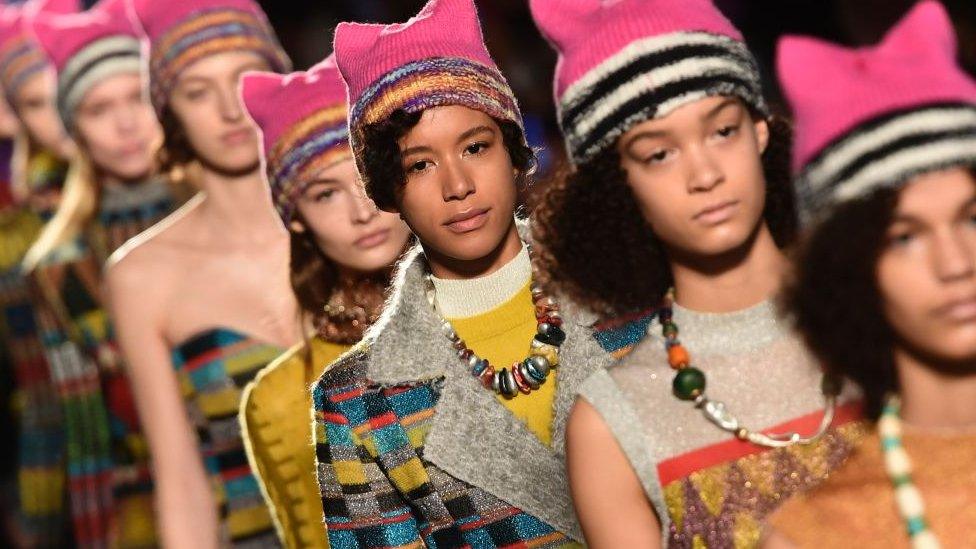
Though international leaders are now more respectful, few could be described as being genuinely admiring. It will take more than his speech before the joint session of Congress, in which Trump sought to stabilise his presidency, to assuage global concerns.
During his inaugural address, Donald Trump paid lip service to the notion of American exceptionalism, though he did not use the phrase.
"We do not seek to impose our way of life on anyone, but rather to let it shine as an example," he declared. "We will shine for everyone to follow."
But rather than painting a picture of sunny American uplands, his inaugural address sketched out something darker and more dystopian: a country marred by poverty-stricken and crime-ridden inner cities and "rusted-out factories scattered like tombstones across the landscape".
The speech will be remembered not for his brief invocation of American exceptionalism, but rather his depiction of "American carnage" and his pledge to put "America First." It was bunker America rather than beacon America.
In his speech to the joint session of Congress, there was another perfunctory acknowledgment of exceptionalism thinking when he said the "torch is now in our hands. And we will use it to light up the world."
But although softer in tone than his angry inaugural, Tuesday night's address was stridently nationalistic nonetheless. "My job is not to represent the world," he affirmed. "My job is to represent the United States of America."
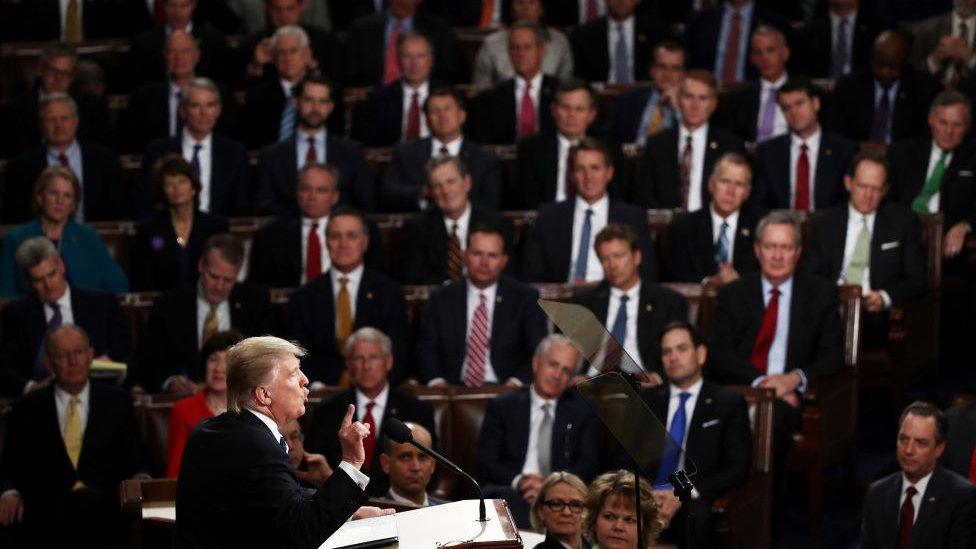
Donald Trump has already signalled he believes that America can be great without it being exceptional. In a jaw-dropping interview with Bill O'Reilly of Fox News broadcast on Super Bowl Sunday, Trump seemed to reject the central tenet of exceptionalist thinking: that American values are the global gold standard.
Asked why he favoured closer ties with the Russian President Vladimir Putin, whom O'Reilly characterised as "a killer", Trump responded: "There are a lot of killers. We've got a lot of killers. What do you think? Our country's so innocent?"
For critics, it implied a moral equivalence between the United States and Russia, a country that in recent years has annexed Crimea, been accused of murdering internal opponents, allegedly committed war crimes in Syria and severely curtailed LGBT rights.
Donald Trump also appears to set more store in hard power, the use and threat of force, than soft power, the use of more subtle forms of suasion such as diplomacy and international aid.
Donald Trump addressed Congress for the first time.
Just look at this week's budget proposal, which calls for an almost 10% splurge on defence spending to be paid for in part by cuts to State Department funding and international aid. Promoting human rights abroad, a central tenet of the exceptionalist creed, no longer appears to be an urgent priority.
The United States is even said to be considering withdrawing from the United Nations Human Rights Council, partly because of what it perceives as UN bias against Israel.
Acting on another exceptionalist impulse, America has traditionally championed press freedom around the world. The First Amendment resonates way beyond these shores.
But with Donald Trump continuing to rage against the US media in an attempt, seemingly, to delegitimise it, America's clarion voice on press freedom has at best been compromised and at worst been rendered mute.
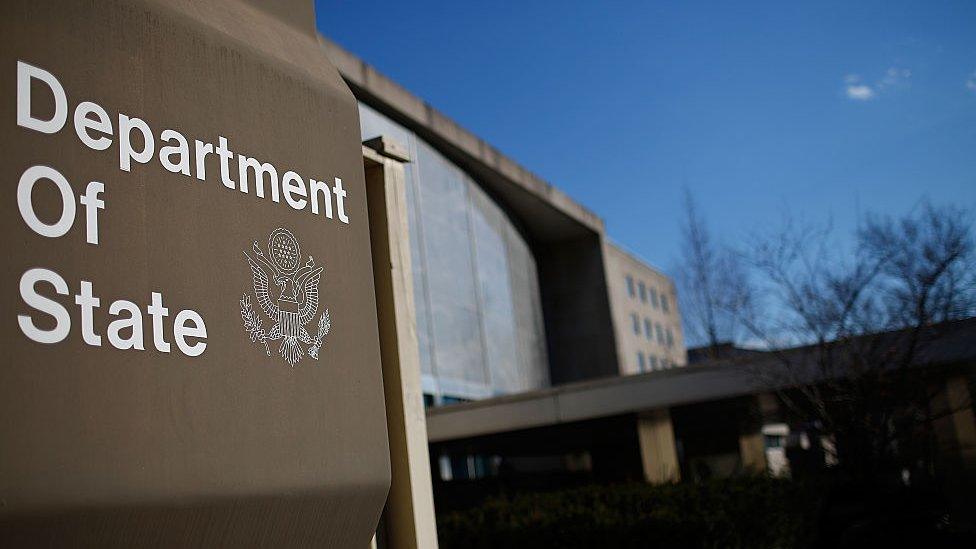
Rather than wanting America to be emulated, it would appear that Trump prefers it to be feared. And although local criticism, from media organisations like the New York Times, lays bare his thin skin, international criticism seems almost to have an emboldening effect.
If other countries are railing against him, it is a sign he is doing his job and delivering on his campaign promises.
It brings to mind the famed chant heard from the stands of Millwall FC, one of the least fashionable clubs in the English football league: "No-one likes us, we don't care."
Right now, it's American adulation that he seems to crave more than global admiration.
To many international ears, American exceptionalism has long sounded like bogus boosterism, a vain conceit.
What right did a country that countenanced slavery and the racial apartheid of Jim Crow have to lecture others?
Even in World War Two, when America became the "arsenal of the democracy" in the defeat of fascism, it was a segregated US military that took to the battlefield.
Vietnam, Watergate, Guantanamo Bay, the Iraq war and electronic eavesdropping. To foreign critics, American exceptionalism doubles as American hypocrisy.
Barack Obama sought to revive the concept after the Bush years, when America's global stock was low, and regularly spoke of exceptionalism. Under his presidency, however, it continued to have negative connotations. America was exceptional because of its high rates of gun crime, its multiple killings and its racial flare-ups.
Rebels in Syria wondered why the Obama administration wasn't doing more to help it oust a murderous despot like Bashar al-Assad. Moreover, Guantamano Bay, a US landmark that loomed larger in the post-911 era than the Statue of Liberty in many Muslim countries, remained open.
Ian Pannell reports from the city of Baltimore: "Hope has given way to despair"
US democracy was also widely seen as falling into disrepute, because of the dysfunction in Washington, the rise of hyper-partisan oppositional politics and the anger that poisoned the entire polity.
The 2016 presidential campaign, pitting two such deeply unpopular candidates against each other in a hugely uninspiring contest, presented an ugly shop window. The Electoral College, for those unversed in its intricacies and anomalies, also seemed demonstrably undemocratic.
How could Donald Trump emerge the victor, they asked, when Hillary Clinton received almost three million more votes?
American exceptionalism was looking shaky even before Donald Trump took the oath of office.
A key difference is that Barack Obama continued until his final days to talk of building a more perfect union, an aspiration that sprung from his exceptionalist ethos, while Donald Trump continues to talk of building that wall along the Mexican border.
Over the centuries, what has set US global leadership apart from the European powers that used to dominate the world is a fundamental difference in national mindset: America came to believe it was born to lead rather than born to rule.
Having won its independence from an imperial power, it sought to colonise the planet with its values and ideas rather than building a territorial empire.
Ever since Franklin Delano Roosevelt brought America into the war, the assertion of global leadership, and the promulgation of its ideas that goes with it, has been deemed central to the national self-interest.
But Trumpism, with its narrower homeland focus, looks like making a definitive break from this past.
His planned wall could end up serving as the metaphor for his presidency.
Trump's America might end up being a forcefully protected citadel, but will it be a city on a hill?
